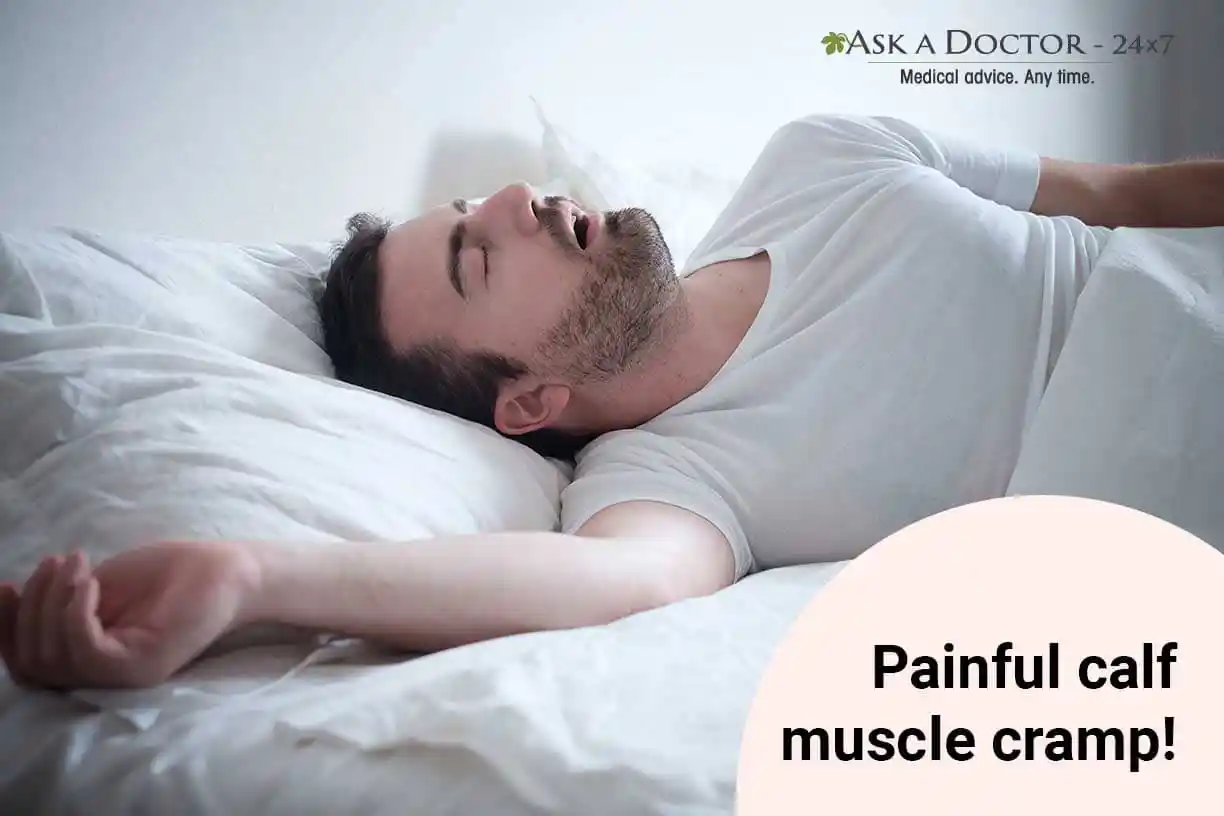What Causes Nighttime Leg Cramping? Follow These Tips To Prevent It
Do you often wake-up mourning in the middle of the sleep due to muscle hardness, tension, and tightness occurring in your calf or foot? May be your suffering from nighttime leg cramping issues. While the effects may vary, these painful sensations may occur many times each night for a few seconds and then remit spontaneously. In some cases they can remain for up to 15–30 minutes and reoccur for several times a week. Additionally, the pain intensity can prevent you from returning to sleep for several hours.
Let us read in detail the basic causes of this menace and find out ways to stay away from nighttime leg cramping.
What does it feel like?

You feel the sudden pain in your calf muscle (below the knee at the back of your leg). This pain and tightness (spasm) will make it hard for you to move your leg for some time (from a few seconds to about 10 minutes). You might also feel tenderness for up to 24 hours after the cramp has stopped. Nighttime leg cramping is the most common reason for pregnancy-related sleep interruption. If your leg cramping is waking you up in the middle of the night, then talk to an online Neurologist about your issue
What causes nighttime leg cramping?
.jpg)
The exact causes of these cramps are not known. And most of the time, they are harmless. However some common causes of nighttime leg cramping can be:
- Aging
- Dehydration (not drinking enough fluids)
- Strenuous exercise (causing excessive strain to muscles)
- Sitting or standing for long hours (decreased blood circulation to the lower limbs)
Certain medical conditions which may be linked to nighttime leg cramping include:
- Peripheral neuropathies
- Hypokalaemia
- Hypothyroidism
- Hypomagnesaemia
- Hypocalcemia
- Hyponatremia
- Pregnancy (last trimester)
- Alcoholism
- Spinal stenosis
- Dialysis
- Chronic liver diseases
How to Get Immediate Relief from Night-time Leg Cramping

As soon as you feel the cramp, do not panic. Try to breathe easy and stop any activity. Stretch the affected leg gently towards your body, and then hold this position for a few seconds and release. This stretch will bring some relief by relaxing the muscles on one side of your joint to accommodate contraction on the other side. You may also gently massage the calf muscle and apply some heat (using a heating pad) to get some additional and immediate relief.
Attempts at relieving the symptoms are focused on reducing abnormal muscle contractions and the discomfort caused due to it. The following can help:
- Tonic water with lemon
- Adequate hydration
- Regular stretching of the calves and thighs before going to sleep
- Vitamin E and magnesium supplements
- Vitamin B complex
- Over-the-counter painkillers, such as acetaminophen or ibuprofen
- Calcium supplements (may reduce the frequency of the night leg cramps)
Tips to prevent nighttime leg cramping
.jpg)
If nighttime leg cramps are disturbing your sleep, you need to take specific measures that will either help to prevent them or reduce their frequency. Try these:
#1.Reduce your risk by practicing regular exercises
Make sure you start your daily work out with these two measures:
- Warm-Up: Warming up before any exercise is always a good idea. It can be critical to do some warm-up activities, such as slow running in place, or even a few minutes of brisk walking.
- Calf Muscle Stretches: Stand and lean forward against a wall with one leg in front of the other. Keep your front knee bent. Straighten your back leg and press your heel into the floor (keep both heels flat on the floor). Hold the position for 15 to 30 seconds. You will feel the stretch in your calf and down towards your heel.
For achieving the best results, you should repeat this exercise three times a day, including one session before retiring to bed. You should continue doing this exercise and as long as you are able to do it comfortably and get favorable results.
#2. Stay well hydrated
If you are practicing exercise in hot weather, overexerted due to sports or work, or you are in your mid-forties or older, then make sure to drink plenty of water to stay hydrated.
#3. Keep your feet in a relaxed position
Whether you sleep lying on your back, side, or front, always:
- Hold a pillow between your legs (if you sleep on your side)
- Place a pillow at the end of your bed with the soles of your feet propped up against it (in case you prefer lying on your back)
- Hang your feet over the end of the bed to keep your feet in relaxed position and stopping the muscles in your calves from getting tense (if you prefer lying on your stomach).
- Keep your sheets and blankets loose
If the cramps are very severe, are increasing in frequency, and do not respond to any of the above treatments, you should consult your doctor immediately.
For more information on night-time leg cramping and related concerns, ask a Neurologist online today!
Ask a Specialist
Recent Questions


